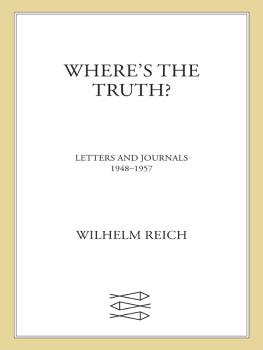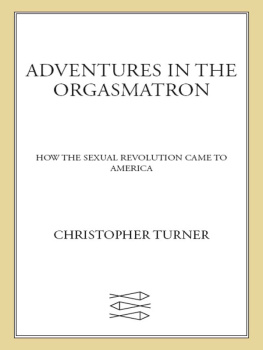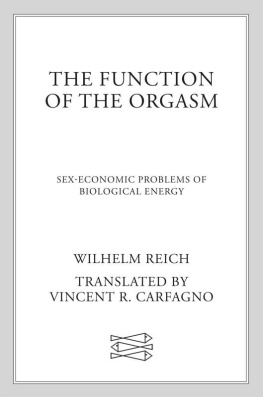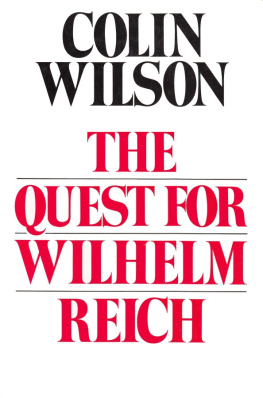Wilhelm Reich and the Function of the Orgasm
Short Biography, Book Reviews, Quotes, and Comments
(Great Minds Series, Vol, 11)
by Peter Fritz Walter
Published by Sirius-C Media Galaxy LLC
113 Barksdale Professional Center, Newark, Delaware, USA
2015 Peter Fritz Walter. Some rights reserved.
2017 Revised, Updated and Reformatted Kindle Edition.
Creative Commons Attribution 4.0 International License
This publication may be distributed, used for an adaptation or for derivative works, also for commercial purposes, as long as the rights of the author are attributed. The attribution must be given to the best of the users ability with the information available. Third party licenses or copyright of quoted resources are untouched by this license and remain under their own license.
The moral right of the author has been asserted
Set in Palatino
Designed by Peter Fritz Walter
Publishing Categories
Biography & Autobiography / Scientists / General
Publisher Contact Information
publisher@sirius-c-publishing.com
http://sirius-c-publishing.com
Author Contact Information
pfw@peterfritzwalter.com
About Dr. Peter Fritz Walter
http://peterfritzwalter.com
About the Author
Parallel to an international law career in Germany, Switzerland and the United States, Dr. Peter Fritz Walter (Pierre) focused upon fine art, cookery, astrology, musical performance, social sciences and humanities.
He started writing essays as an adolescent and received a high school award for creative writing and editorial work for the school magazine.
After finalizing his law diplomas, he graduated with an LL.M. in European Integration at Saarland University, Germany, and with a Doctor of Law title from University of Geneva, Switzerland, in 1987.
He then took courses in psychology at the University of Geneva and interviewed a number of psychotherapists in Lausanne and Geneva, Switzerland. His interest was intensified through a hypnotherapy with an Ericksonian American hypnotherapist in Lausanne. This led him to the recovery and healing of his inner child.
In 1986, he met the late French psychotherapist and child psychoanalyst Franoise Dolto (1908-1988) in Paris and interviewed her. A long correspondence followed up to their encounter which was considered by the curators of the Dolto Trust interesting enough to be published in a book alongside all of Doltos other letter exchanges by Gallimard Publishers in Paris, in 2005.
After a second career as a corporate trainer and personal coach, Pierre retired as a full-time writer, philosopher and consultant.
His nonfiction books emphasize a systemic, holistic, cross-cultural and interdisciplinary perspective, while his fiction works and short stories focus upon education, philosophy, perennial wisdom, and the poetic formulation of an integrative worldview.
Pierre is a German-French bilingual native speaker and writes English as his 4th language after German, Latin and French. He also reads source literature for his research works in Spanish, Italian, Portuguese, and Dutch. In addition, Pierre has notions of Thai, Khmer, Chinese and Japanese.
All of Pierres books are hand-crafted and self-published, designed by the author. Pierre publishes via his Delaware company, Sirius-C Media Galaxy LLC, and under the imprints of IPUBLICA and SCM (Sirius-C Media).
It is sexual energy which governs the structure of human feeling and thinking.
Wilhelm Reich, The Sexual Revolution (1945/1962)
Contents
About Great Minds Series
A Pioneer in Holistic Science
The Genius of Wilhelm Reich
Reichs Greatest Discoveries
Orgonomy and Schizophrenia
Book Reviews
The Functions of the Orgasms
Wilhelm Reich und Orgonomie
Quotes
Contextual Bibliography
Introduction
About Great Minds Series
We are currently transiting as a human race a time of great challenge and adventure that opens to us new pathways for rediscovering and integrating the perennial holistic wisdom of ancient civilizations into our modern science paradigm. These civilizations were thriving before patriarchy was putting nature upside-down.
Currently, with the advent of the networked global society, and systems theory as its scientific paradigm, we are looking into a different world, with a rise of horizontal and sustainable structures both in our business culture, and in science, and last not least on the important areas of psychology, medicine, and spirituality.
A paradigm, from Greek paradeigma, is a pattern of things, a configuration of ideas, a set of dominant beliefs, a certain way of looking at the world, a set of assumptions, a frame of reference or lens, and even an entire worldview.
While most of this new and yet old path has yet to be trotted, we cannot any longer overlook the changes that happen all around us virtually every day.
Invariably, as students, scientists, doctors, consultants, lawyers, business executives or government officials, we face problems today that are so complex, entangled and novel that they cannot possibly be solved on the basis of our old paradigm, and our old way of thinking. As Albert Einstein said, we cannot solve a problem on the same level of thought that created it in the first place hence the need for changing our view of looking at things, the world, and our personal and collective predicaments.
What still about half a decade ago seemed unlikely is happening now all around us: we are rediscovering more and more fragments of an integrative and holistic wisdom that represents the cultural and scientific treasure of many ancient tribes and kingdoms that were based upon a perennial tradition which held that all in our universe is interconnected and interrelated, and that humans are set in the world to live in unison with the infinite wisdom inherent in creation as a major task for driving evolution forward!
It happens in science, since the advent of relativity theory, quantum physics and string theory, it happens in neuroscience and systems theory, it happens in molecular biology, and in ecology, and as a result, and because science is a major motor in society, it happens now with increasing speed in the industrial and the business world, and in the way people earn their lives and manifest their innate talents through their professional engagement.
And it happens also, and what this book is set to emphasize, in psychology and psychoanalysis, for Franoise Dolto, while having been a member of the Freudian psychoanalytic school, has created an approach to healing psychotic children that was really unknown to the founder of psychoanalysis, Sigmund Freud.
More and more people begin to realize that we cannot honestly continue to destroy our globe by disregarding the natural law of self-regulation, both outwardly, by polluting air and water, and inside, by tolerating our emotions to be in a state of repression and turmoil.
Self-regulation is built into the life function and it can be found as a consistent pattern in the lifestyle of natives peoples around the world. It is similar with our immense intuitive and imaginal faculties that were downplayed in centuries of darkness and fragmentation, and that now emerge anew as major key stones in a worldview that puts the whole human at the frontline, a human who uses their whole brain, and who knows to balance their emotions and natural passions so as to arrive at a state of inner peace and synergetic relationships with others that bring mutual benefit instead of one-sided egotistic satisfaction.
For lasting changes to happen, however, to paraphrase J. Krishnamurti, we need to change the thinker, we need to undergo a transformation that puts our higher self up as the caretaker of our lives, not our conditioned ego.
Next page




